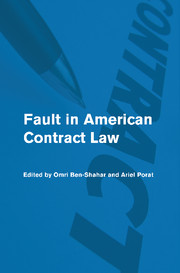Book contents
- Frontmatter
- Contents
- List of Contributors
- Preface
- Acknowledgment
- I THE CASE FOR STRICT LIABILITY
- II THE CASE FOR FAULT
- 4 How Fault Shapes Contract Law
- 5 Fault in Contract Law
- 6 The Role of Fault in Contract Law: Unconscionability, Unexpected Circumstances, Interpretation, Mistake, and Nonperformance
- III BETWEEN STRICT LIABILITY AND FAULT
- IV WILLFUL BREACH
- V COMPARATIVE FAULT
- VI THE MORALITY OF BREACH
- Case Index
- Subject Index
- References
6 - The Role of Fault in Contract Law: Unconscionability, Unexpected Circumstances, Interpretation, Mistake, and Nonperformance
Published online by Cambridge University Press: 10 November 2010
- Frontmatter
- Contents
- List of Contributors
- Preface
- Acknowledgment
- I THE CASE FOR STRICT LIABILITY
- II THE CASE FOR FAULT
- 4 How Fault Shapes Contract Law
- 5 Fault in Contract Law
- 6 The Role of Fault in Contract Law: Unconscionability, Unexpected Circumstances, Interpretation, Mistake, and Nonperformance
- III BETWEEN STRICT LIABILITY AND FAULT
- IV WILLFUL BREACH
- V COMPARATIVE FAULT
- VI THE MORALITY OF BREACH
- Case Index
- Subject Index
- References
Summary
It is often asserted that contract law is based on strict liability, not fault. This assertion is incorrect. As this chapter demonstrates, fault is a basic building block of contract law, and pervades the field. Contract law discriminates between two types of fault: the violation of strong moral norms, such as the prohibition of deception, and the violation of somewhat weaker norms, such as the requirement of due care. Where both types of fault are relevant, one party's violation of a strong moral norm will normally override the other party's violation of a weaker moral norm. Fault is pervasive in contract law because it should be. If moral obligation and fault were removed from contract law, the contracting system would be much less efficient. The efficiency of the contracting system rests on a tripod whose legs are legal remedies, reputational effects, and the internalization of social norms – in particular, the moral norm of promise keeping. All three legs are necessary to ensure the reliability, and therefore the efficiency, of the contracting system.
Introduction
The Second Restatement of Contracts states that “[c]ontract liability is strict liability. It is an accepted maxim that pacta sunt servanda, contracts are to be kept. The obligor is therefore liable in damages for breach of contract even if he is without fault.” Similarly, Farnsworth's treatise states that “contract law is, in its essential design, a law of strict liability, and the accompanying system of remedies operates without regard to fault.”
Information
- Type
- Chapter
- Information
- Fault in American Contract Law , pp. 82 - 98Publisher: Cambridge University PressPrint publication year: 2010
References
Accessibility standard: Unknown
- 2
- Cited by
